介词inon:at及其练习附答案
2024年三年级英语介词at、in、on的用法练习题20题
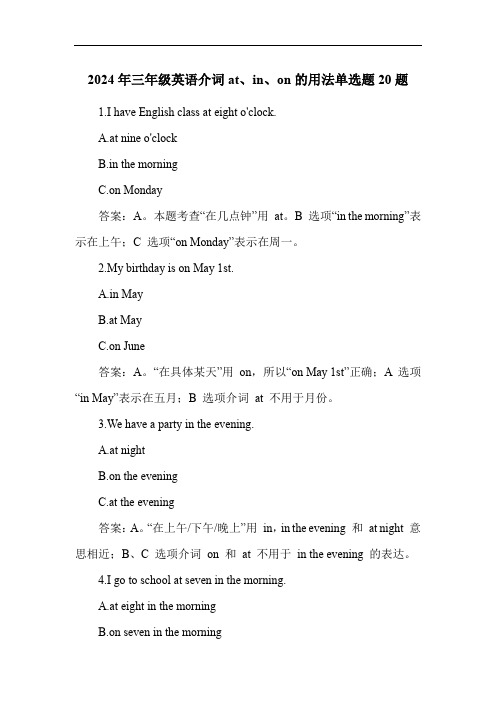
2024年三年级英语介词at、in、on的用法单选题20题1.I have English class at eight o'clock.A.at nine o'clockB.in the morningC.on Monday答案:A。
本题考查“在几点钟”用at。
B 选项“in the morning”表示在上午;C 选项“on Monday”表示在周一。
2.My birthday is on May 1st.A.in MayB.at MayC.on June答案:A。
“在具体某天”用on,所以“on May 1st”正确;A 选项“in May”表示在五月;B 选项介词at 不用于月份。
3.We have a party in the evening.A.at nightB.on the eveningC.at the evening答案:A。
“在上午/下午/晚上”用in,in the evening 和at night 意思相近;B、C 选项介词on 和at 不用于in the evening 的表达。
4.I go to school at seven in the morning.A.at eight in the morningB.on seven in the morning答案:A。
“在几点钟”用at,“在上午”用in;B、C 选项介词搭配错误。
5.The meeting is on Tuesday afternoon.A.in Tuesday afternoonB.at Tuesday afternoonC.on Wednesday afternoon答案:A。
“在具体某天的上午/下午/晚上”用on;B 选项at 不用于此;C 选项不是题目中的时间。
6.My mother gets up at six.A.at sevenB.in sixC.on six答案:A。
“在几点钟”用at;B、C 选项介词错误。
三年级英语介词at、in、on的用法练习题30题(带答案)
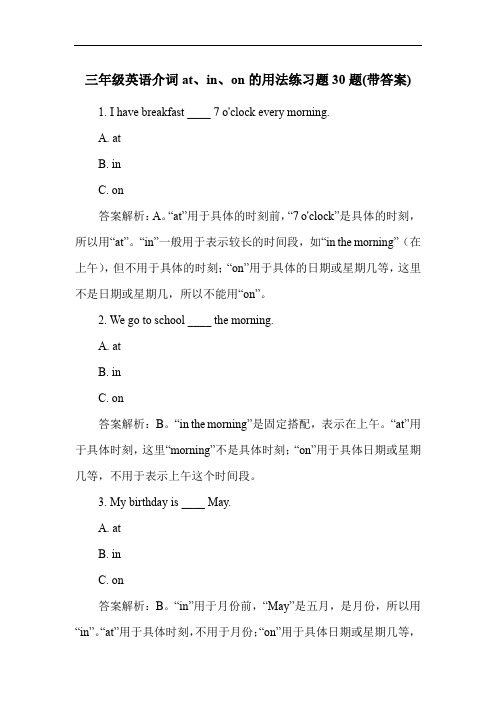
三年级英语介词at、in、on的用法练习题30题(带答案)1. I have breakfast ____ 7 o'clock every morning.A. atB. inC. on答案解析:A。
“at”用于具体的时刻前,“7 o'clock”是具体的时刻,所以用“at”。
“in”一般用于表示较长的时间段,如“in the morning”(在上午),但不用于具体的时刻;“on”用于具体的日期或星期几等,这里不是日期或星期几,所以不能用“on”。
2. We go to school ____ the morning.A. atB. inC. on答案解析:B。
“in the morning”是固定搭配,表示在上午。
“at”用于具体时刻,这里“morning”不是具体时刻;“on”用于具体日期或星期几等,不用于表示上午这个时间段。
3. My birthday is ____ May.A. atB. inC. on答案解析:B。
“in”用于月份前,“May”是五月,是月份,所以用“in”。
“at”用于具体时刻,不用于月份;“on”用于具体日期或星期几等,这里不是具体日期,不能用“on”。
4. She has a party ____ Saturday.A. atB. inC. on答案解析:C。
“on”用于星期几前,“Saturday”是星期六,所以用“on”。
“at”用于具体时刻,不用于星期几;“in”用于较长时间段,不用于星期几。
5. They play football ____ the afternoon.A. atB. inC. on答案解析:B。
“in the afternoon”是固定搭配,表示在下午。
“at”用于具体时刻,这里“afternoon”不是具体时刻;“on”用于具体日期或星期几等,不用于表示下午这个时间段。
6. He goes to bed ____ 9:30.A. atB. inC. on答案解析:A。
(完整版)介词in-on-at及其练习附答案

时间介词in, on与at的用法介词in, on与at都可用于表示时间的名词前,但用法各不相同,其区别在于:一、用in的场合(1)表示“在某年/月/季节”这个含义时,须用介词in。
例如:She came to this city in 1980.他于1980年来到这个城市。
It often rains here in summer.夏天这里常常下雨。
(2)表示“从现在起一段时间以后”时,须用介词in。
例如:They will go to see you in a week.他们将在一周后去看望你。
I will be back in a month.我将在一个月后回来。
(3)表示“在某世纪”时,须用介词in.例如:This machine was invented in the eighteenth century.这台机器是在18世纪发明的.Great changes took place in the twentieth century.20世纪发生了巨大变化.(4)表示“在某年代或特定世纪某年代”时,须用介词in。
例如:This incident happened in the 1970““““s.该事件发生在20世纪70年代。
The Anti-Japanese War broke out in the 1930““““s.抗日战争爆发于20世纪30年代。
(5)除此之外,morning / evening / afternoon三个词也常跟介词in连用。
例如:Don“t watch TV too much in the evening.晚上看电视不要太多。
They sometimes play games in the afternoon.他们有时在下午做游戏。
二、用on的场合(1)表示“在详尽的某一天”或“(在详尽的某一天的)早上、中午、晚上”等,须用介词on。
例如:Jack was born on May 10th,1982.杰克生于1982年5月10日。
12 介词in,on,at 全国通用版(含答案)

语法——介词in on atPart 1:知识点一、介词:是一种虚词,在句子中表示名词或代词与其他词之间的关系,不能单独做为句子成分,常位于名词或代词前面构成介词短语。
二、具体用法:常用介词1.in(1)表示方位:在……里面例句:There are three books in my bag.我书包里有三本书。
(2)表示地点:A.表示在大地方例句:I live in Hangzhou.我住在杭州。
B.表示属于该范围例句:Hei Longji ang lies in the north of China.黑龙江在中国北部。
(3)表示时间:A.表示一段时间(比较长)例:in summer在夏天in 2021在2021年in February 在二月B.表示在早上、下午、晚上例:in the morning/afternoon/evening(4)表示使用某种材料、语言等:例句:I can sing the song in English.我能用英语唱这首歌。
2.on(1)表示地点:在……上面例句:There is an apple on the desk.桌子上有一本书。
(2)表示时间:A.表示在具体某一天的上午、下午或晚上例:on June thirteenth在六月13日on the morning of May 1st在五月一日的早上B.表示在星期几的上午、下午或晚上例:on Friday在周五on Saturday afternoon在周六的下午2.at(1)表示在小地点:例:at school /home(2)表示时间点:例:at seven在七点at night在夜晚Part 2:练习一、用介词填空。
1.My mother begins to work ______ 8:00 ______ t he morning.2.Do you stay ______ home ______ weekend?3.They live ______ a new house now.4.Xinjiang is ______ the west of China.5.Lily usually have breakfast ______ the morning.6.They often have lunch ______ half past twelve.7.What’s this ______ English?8.There is a big gym ______ my school.9.She came to this city ______ 2020.10.It often snows here ______ winter.11.I will be back ______ a month.12.Don’t watch TV too much ______ the evening.13.Sally was born ______ May 11th.14.We don’t go to school ______ Saturday and S unday.15.They were happy ______ that time.16.______ the age of ten, I began to learn English.17.What do you often do ______ noon?18.______ a cold winter morning, I met her in the street.19.Mrs. Green came to Beijing ______ 2005.20.Children wake up very early ______ the morning ofChristmas Day.答案:1.at in2.at on3.in4.in5.in6.at7.in8.in9.in 10.i n 11.in 12.in 13.on 14.on 15.at 16.At 17.at 18.On 19.in 20.on。
介词in-on-at及其练习附答案
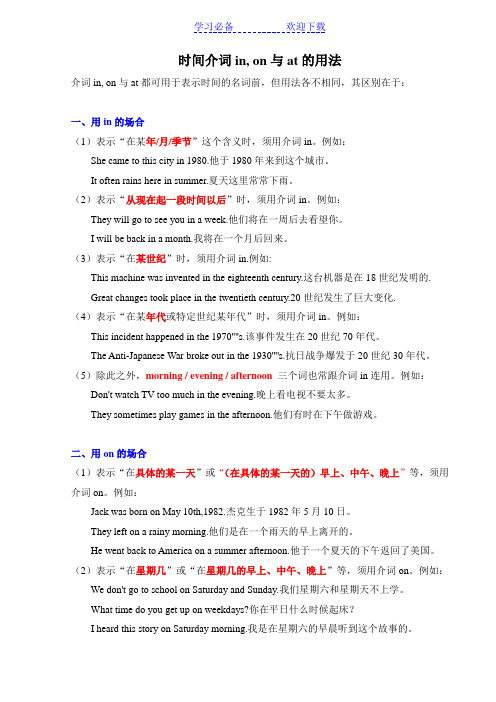
时间介词in, on与at的用法介词in, on与at都可用于表示时间的名词前,但用法各不相同,其区别在于:一、用in的场合(1)表示“在某年/月/季节”这个含义时,须用介词in。
例如:She came to this city in 1980.他于1980年来到这个城市。
It often rains here in summer.夏天这里常常下雨。
(2)表示“从现在起一段时间以后”时,须用介词in。
例如:They will go to see you in a week.他们将在一周后去看望你。
I will be back in a month.我将在一个月后回来。
(3)表示“在某世纪”时,须用介词in.例如:This machine was invented in the eighteenth century.这台机器是在18世纪发明的.Great changes took place in the twentieth century.20世纪发生了巨大变化.(4)表示“在某年代或特定世纪某年代”时,须用介词in。
例如:This incident happened in the 1970''''s.该事件发生在20世纪70年代。
The Anti-Japanese War broke out in the 1930''''s.抗日战争爆发于20世纪30年代。
(5)除此之外,morning / evening / afternoon三个词也常跟介词in连用。
例如:Don't watch TV too much in the evening.晚上看电视不要太多。
They sometimes play games in the afternoon.他们有时在下午做游戏。
二、用on的场合(1)表示“在具体的某一天”或“(在具体的某一天的)早上、中午、晚上”等,须用介词on。
介词in,on,at及其练习附答案(解析版)

介词in,on,at及其练习附答案(解析版)介词in、on和at在表示时间的名词前的使用有所不同。
具体区别如下:一、使用in的情况:1.表示“在某年/月/季节”时,需要使用介词in。
例如:她于1980年来到这个城市。
夏天这里经常下雨。
2.表示“从现在起一段时间以后”时,需要使用介词in。
例如:他们将在一周后去看望你。
我将在一个月后回来。
3.表示“在某个世纪”时,需要使用介词in。
例如:这台机器是在18世纪发明的。
20世纪发生了巨大变化。
4.表示“在某个年代或特定世纪某个年代”时,需要使用介词in。
例如:该事件发生在20世纪70年代。
抗日战争爆发于20世纪30年代。
5.除此之外,morning、evening和afternoon三个词也常与介词in连用。
例如:晚上看电视不要太多。
他们有时在下午做游戏。
二、使用on的情况:1.表示“在具体的某一天”或“(在具体的某一天的)早上、中午、晚上”等,需要使用介词on。
例如:杰克生于1982年5月10日。
他们是在一个雨天的早上离开的。
他于一个夏天的下午返回了美国。
2) 表示星期几或其时间,需使用介词on。
例如:我们星期六和星期天不上学。
平日你几点起床?我是在星期六的早晨听到这个故事的。
3) 表示某个节日,需使用介词on。
例如:我们通常在中秋节吃月饼。
胡老师在教师节那天收到了一张卡片。
1) 表示具体时间点,需使用介词at。
例如:他每天六点起床。
昨天下午五点半我到家了。
2) 表示特定的时节或时机,需使用介词at。
例如:他们那时很幸福。
我认为商店在白天的这个时候关门了。
3) 表示中午、夜晚或周末,需使用介词at。
例如:你中午经常做些什么?夜晚你能看到天空中有许多星星。
4) 表示某个年龄,需使用介词at。
例如:这个男孩在九岁的时候就游泳游得很好了。
When I was twenty years old。
I started teaching English at a school。
介词in,on,at及其练习附答案

时间介词in, on与at的用法介词in, on与at都可用于表示时间的名词前,但用法各不相同,其区别在于:一、用in的场合(1)表示“在某年/月/季节”这个含义时,须用介词in。
例如:She came to this city in 1980.他于1980年来到这个城市。
It often rains here in summer.夏天这里常常下雨。
(2)表示“从现在起一段时间以后”时,须用介词in。
例如:They will go to see you in a week.他们将在一周后去看望你。
I will be back in a month.我将在一个月后回来。
(3)表示“在某世纪”时,须用介词in.例如:This machine was invented in the eighteenth century.这台机器是在18世纪发明的.Great changes took place in the twentieth century.20世纪发生了巨大变化.(4)表示“在某年代或特定世纪某年代”时,须用介词in。
例如:This incident happened in the 1970''''s.该事件发生在20世纪70年代。
The Anti-Japanese War broke out in the 1930''''s.抗日战争爆发于20世纪30年代。
(5)除此之外,morning / evening / afternoon三个词也常跟介词in连用。
例如:Don't watch TV too much in the evening.晚上看电视不要太多。
They sometimes play games in the afternoon.他们有时在下午做游戏。
二、用on的场合(1)表示“在具体的某一天”或“(在具体的某一天的)早上、中午、晚上”等,须用介词on。
时间介词in,on,at用法练习答案解析

时间介词:in/on/at1. Mrs Brown came to China ______ 1996.A. onB. atC. toD. in参考答案:D“年”前面用介词in,故正确答案为D。
2. Ann moved to Suzhou ______ September, 1992.A. inB. onC. atD. to参考答案:A“月份”前面用介词in,故正确答案为A。
3. My favourite season is winter because I can skate ______ winter.A. atB. onC. inD. to参考答案:C“季节”前面用介词in,故正确答案为C。
4. The English teacher told me to get there ______ half past ten.A. inB. atC. onD. of参考答案:B“时间点”前面用介词at,“half past ten”是时间点,故正确答案为B。
5. He often goes school ______ six thirty ______ the morning.A. to; inB. at; inC. for; atD. at; to参考答案:B“时间点”前面用介词at,“在早上”前面用in,故正确答案为B。
6.选择适当的单词填空My grandfather was born ______ Oct. 10, 1935. (on/in)参考答案:on“具体到某一天”用介词on,故该空应填on。
7.选择适当的单词填空______ a cold winter morning, I met her in the street. (on/in)参考答案:on“具体到某一天的早上”用介词on,该句具体到了“在一个寒冷的冬天的早上”,因此应该用介词on。
8选择适当的单词填空They started off ______ an autumn afternoon. (on/in)参考答案:on“具体到某一天的下午”用介词on,该句具体到了“在一个秋天的下午”,因此应该用介词on。
at.in.on练习题附答案
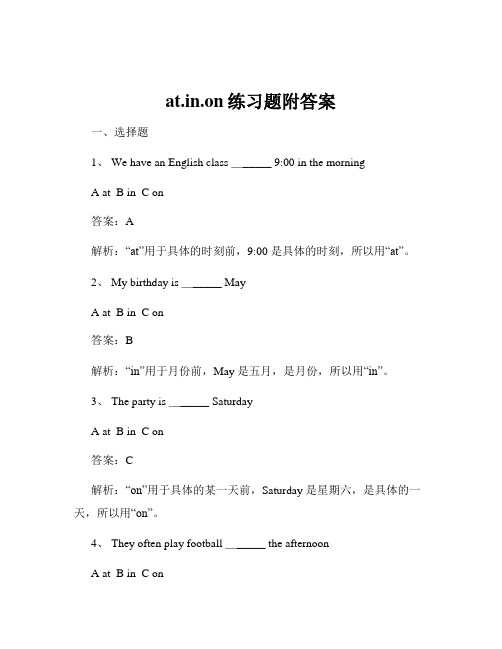
at.in.on练习题附答案一、选择题1、 We have an English class ______ 9:00 in the morningA atB inC on答案:A解析:“at”用于具体的时刻前,9:00 是具体的时刻,所以用“at”。
2、 My birthday is ______ MayA atB inC on答案:B解析:“in”用于月份前,May 是五月,是月份,所以用“in”。
3、 The party is ______ SaturdayA atB inC on答案:C解析:“on”用于具体的某一天前,Saturday 是星期六,是具体的一天,所以用“on”。
4、 They often play football ______ the afternoonA atB inC on解析:“in the afternoon”是固定短语,表示“在下午”。
5、 The meeting is ______ March 12thA atB inC on答案:C解析:“on”用于具体的日期前,March 12th 是三月十二日,是具体的日期,所以用“on”。
6、 I usually get up ______ six o'clockA atB inC on答案:A解析:“at”用于具体的时刻前,six o'clock 是六点钟,是具体的时刻,所以用“at”。
7、 The concert is ______ winterA atB inC on答案:B解析:“in”用于季节前,winter 是冬季,是季节,所以用“in”。
8、 She was born ______ 1998、A atB inC on解析:“in”用于年份前,1998 是年份,所以用“in”。
9、 There is a big tree ______ the houseA atB inC on答案:A解析:“at”表示在某个地点或位置,“at the house”表示在房子处。
时间介词in,on,at用法练习答案解析

时间介词:in/on/at1. Mrs Brown came to China ______ 1996.A. onB. atC. toD. in参考答案:D“年”前面用介词in,故正确答案为D。
2. Ann moved to Suzhou ______ September, 1992.A. inB. onC. atD. to参考答案:A“月份”前面用介词in,故正确答案为A。
3. My favourite season is winter because I can skate ______ winter.A. atB. onC. inD. to参考答案:C“季节”前面用介词in,故正确答案为C。
4. The English teacher told me to get there ______ half past ten.A. inB. atC. onD. of参考答案:B“时间点”前面用介词at,“half past ten”是时间点,故正确答案为B。
5. He often goes school ______ six thirty ______ the morning.A. to; inB. at; inC. for; atD. at; to参考答案:B“时间点”前面用介词at,“在早上”前面用in,故正确答案为B。
6.选择适当的单词填空My grandfather was born ______ Oct. 10, 1935. (on/in)参考答案:on“具体到某一天”用介词on,故该空应填on。
7.选择适当的单词填空______ a cold winter morning, I met her in the street. (on/in)参考答案:on“具体到某一天的早上”用介词on,该句具体到了“在一个寒冷的冬天的早上”,因此应该用介词on。
8选择适当的单词填空They started off ______ an autumn afternoon. (on/in)参考答案:on“具体到某一天的下午”用介词on,该句具体到了“在一个秋天的下午”,因此应该用介词on。
三年级英语介词at、in、on的用法练习题20题含答案解析

三年级英语介词at、in、on的用法练习题20题含答案解析1.We have a music class ____ Monday.A.atB.inC.on答案解析:C。
“on”用于具体的某一天,“Monday”是具体的一天,所以用“on”。
“at”用于具体的时间点,如“at six o'clock”。
“in”用于较长的时间段,如“in the morning”。
2.My birthday is ____ May.A.atB.inC.on答案解析:B。
“in”用于较长的时间段,“May”是一个月,属于较长的时间段,所以用“in”。
“at”用于具体的时间点,“on”用于具体的某一天。
3.We usually go swimming ____ summer.A.atB.inC.on答案解析:B。
“in”用于较长的时间段,“summer”是一个季节,属于较长的时间段,所以用“in”。
“at”用于具体的时间点,“on”用于具体的某一天。
4.My father gets up ____ six o'clock.A.atB.inC.on答案解析:A。
“at”用于具体的时间点,“six o'clock”是具体的时间点,所以用“at”。
“in”用于较长的时间段,“on”用于具体的某一天。
5.We have a picnic ____ Sunday afternoon.A.atB.inC.on答案解析:C。
“on”用于具体的某一天的上午、下午或晚上,“Sunday afternoon”是具体的某一天的下午,所以用“on”。
“at”用于具体的时间点,“in”用于较长的时间段。
6.The party is ____ the evening of June 1st.A.atB.inC.on答案解析:C。
“on”用于具体的某一天的上午、下午或晚上,“the evening of June 1st”是具体的某一天的晚上,所以用“on”。
八年级英语介词特殊用法练习题40题答案解析
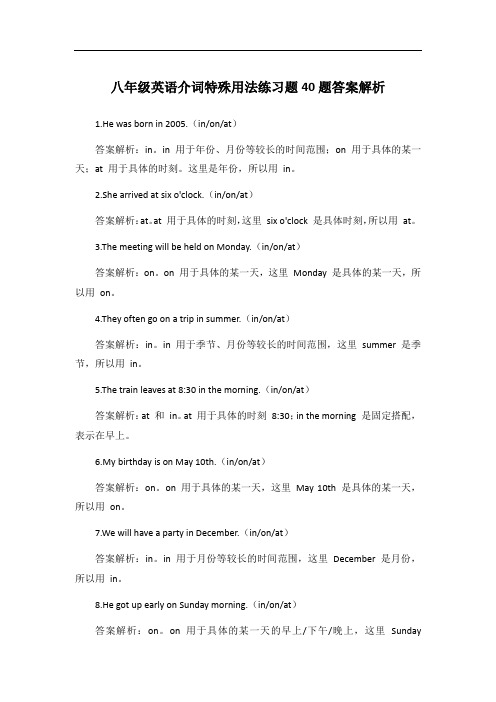
八年级英语介词特殊用法练习题40题答案解析1.He was born in 2005.(in/on/at)答案解析:in。
in 用于年份、月份等较长的时间范围;on 用于具体的某一天;at 用于具体的时刻。
这里是年份,所以用in。
2.She arrived at six o'clock.(in/on/at)答案解析:at。
at 用于具体的时刻,这里six o'clock 是具体时刻,所以用at。
3.The meeting will be held on Monday.(in/on/at)答案解析:on。
on 用于具体的某一天,这里Monday 是具体的某一天,所以用on。
4.They often go on a trip in summer.(in/on/at)答案解析:in。
in 用于季节、月份等较长的时间范围,这里summer 是季节,所以用in。
5.The train leaves at 8:30 in the morning.(in/on/at)答案解析:at 和in。
at 用于具体的时刻8:30;in the morning 是固定搭配,表示在早上。
6.My birthday is on May 10th.(in/on/at)答案解析:on。
on 用于具体的某一天,这里May 10th 是具体的某一天,所以用on。
7.We will have a party in December.(in/on/at)答案解析:in。
in 用于月份等较长的时间范围,这里December 是月份,所以用in。
8.He got up early on Sunday morning.(in/on/at)答案解析:on。
on 用于具体的某一天的早上/下午/晚上,这里Sundaymorning 是具体的某一天的早上,所以用on。
9.The concert will start at 7 pm.(in/on/at)答案解析:at。
三年级英语介词at、in、on的用法练习题20题(答案解析)

三年级英语介词at、in、on的用法练习题20题(答案解析)1.We have English class at eight o'clock.A.atB.inC.on答案解析:A。
at 用于具体的时间点,eight o'clock 是具体的时间点,所以用at。
in 用于较大的时间范围,比如in the morning。
on 用于具体的某一天,比如on Monday。
2.She was born in May.A.atB.inC.on答案解析:B。
in 用于较大的时间范围,May 是一个月,属于较大的时间范围,所以用in。
at 用于具体的时间点,on 用于具体的某一天。
3.My birthday is on July 1st.A.atB.inC.on答案解析:C。
on 用于具体的某一天,July 1st 是具体的一天,所以用on。
at 用于具体的时间点,in 用于较大的时间范围。
4.The meeting is at 3 pm.A.atB.inC.on答案解析:A。
at 用于具体的时间点,3 pm 是具体的时间点,所以用at。
in 用于较大的时间范围,on 用于具体的某一天。
5.We go to school in the morning.A.atB.inC.on答案解析:B。
in 用于较大的时间范围,the morning 是较大的时间范围,所以用in。
at 用于具体的时间点,on 用于具体的某一天。
6.The party is on Sunday.A.atB.inC.on答案解析:C。
on 用于具体的某一天,Sunday 是具体的一天,所以用on。
at 用于具体的时间点,in 用于较大的时间范围。
7.I do my homework at night.A.atB.inC.on答案解析:A。
at 用于具体的时间点,night 在这里表示晚上这个时间点,所以用at。
in 用于较大的时间范围,on 用于具体的某一天。
at.in.on练习题附答案
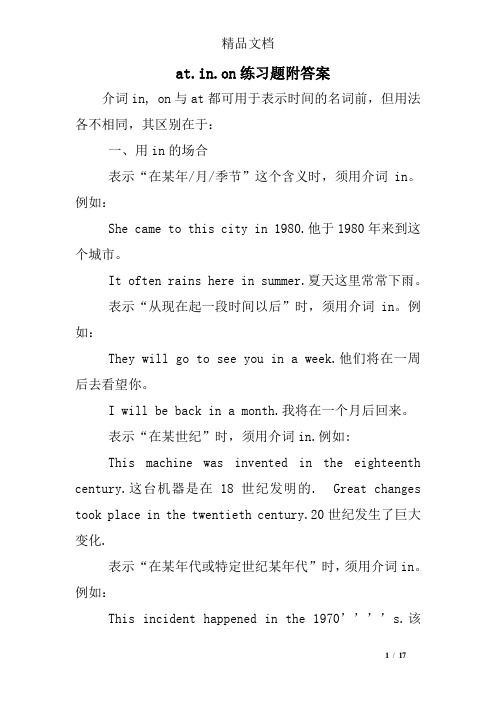
at.in.on练习题附答案介词in, on与at都可用于表示时间的名词前,但用法各不相同,其区别在于:一、用in的场合表示“在某年/月/季节”这个含义时,须用介词in。
例如:She came to this city in 1980.他于1980年来到这个城市。
It often rains here in summer.夏天这里常常下雨。
表示“从现在起一段时间以后”时,须用介词in。
例如:They will go to see you in a week.他们将在一周后去看望你。
I will be back in a month.我将在一个月后回来。
表示“在某世纪”时,须用介词in.例如:This machine was invented in the eighteenth century.这台机器是在18世纪发明的. Great changes took place in the twentieth century.20世纪发生了巨大变化.表示“在某年代或特定世纪某年代”时,须用介词in。
例如:This incident happened in the 1970’’’’s.该事件发生在20世纪70年代。
The Anti-Japanese War broke out in the 1930’’’’s.抗日战争爆发于20世纪30年代。
除此之外,morning / evening / afternoon 三个词也常跟介词in连用。
例如:Don’t watch TV too much in the evening.晚上看电视不要太多。
They sometimes play games in the afternoon.他们有时在下午做游戏。
二、用on的场合表示“在具体的某一天”或“早上、中午、晚上”等,须用介词on。
例如:Jack was born on May 10th,1982.杰克生于1982年5月10日。
英语语法介词in,on,at及其练习附答案

介词in, on与at的用法(WORD版本真题试卷+名师解析答案,建议下载保存)介词in, on与at都可用于表示时间的名词前,但用法各不相同,其区别在于:一、用in的场合(1)表示“在某年/月/季节”这个含义时,须用介词in。
例如:She came to this city in 1980.他于1980年来到这个城市。
It often rains here in summer.夏天这里常常下雨。
(2)表示“从现在起一段时间以后”时,须用介词in。
例如:They will go to see you in a week.他们将在一周后去看望你。
I will be back in a month.我将在一个月后回来。
(3)表示“在某世纪”时,须用介词in.例如:This machine was invented in the eighteenth century.这台机器是在18世纪发明的.Great changes took place in the twentieth century.20世纪发生了巨大变化.(4)表示“在某年代或特定世纪某年代”时,须用介词in。
例如:This incident happened in the 1970''''s.该事件发生在20世纪70年代。
The Anti-Japanese War broke out in the 1930''''s.抗日战争爆发于20世纪30年代。
(5)除此之外,morning / evening / afternoon三个词也常跟介词in连用。
例如:Don't watch TV too much in the evening.晚上看电视不要太多。
They sometimes play games in the afternoon.他们有时在下午做游戏。
二、用on的场合(1)表示“在具体的某一天”或“(在具体的某一天的)早上、中午、晚上”等,须用介词on。
在课堂中练习In、on、at地点介词
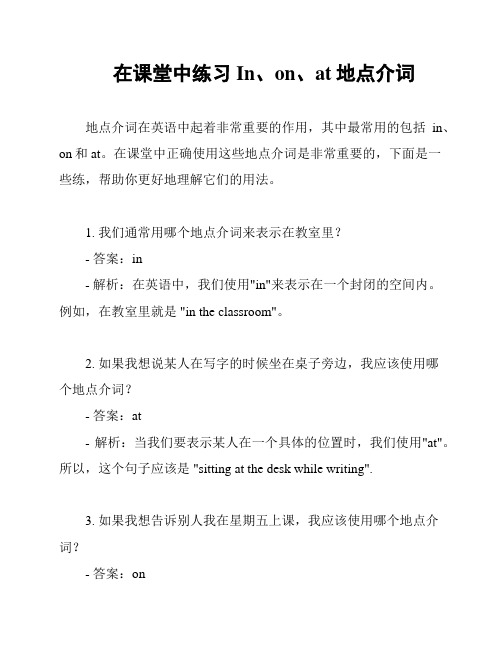
在课堂中练习In、on、at地点介词地点介词在英语中起着非常重要的作用,其中最常用的包括in、on和at。
在课堂中正确使用这些地点介词是非常重要的,下面是一些练,帮助你更好地理解它们的用法。
1. 我们通常用哪个地点介词来表示在教室里?- 答案:in- 解析:在英语中,我们使用"in"来表示在一个封闭的空间内。
例如,在教室里就是 "in the classroom"。
2. 如果我想说某人在写字的时候坐在桌子旁边,我应该使用哪个地点介词?- 答案:at- 解析:当我们要表示某人在一个具体的位置时,我们使用"at"。
所以,这个句子应该是 "sitting at the desk while writing".3. 如果我想告诉别人我在星期五上课,我应该使用哪个地点介词?- 答案:on- 解析:在表示某一天或日期时,我们使用"on"。
所以,这个句子应该是 "I have class on Friday".4. 如果我想告诉别人我在9点钟上课,我应该使用哪个地点介词?- 答案:at- 解析:当我们要表示具体的时间时,我们使用"at"。
所以,这个句子应该是 "I have class at 9 o'clock".5. 如果我想说某人在黑板前面,我应该使用哪个地点介词?- 答案:in front of- 解析:当我们要表示某物或某人在另一个物体或位置的前面时,我们使用"in front of"。
所以,这个句子应该是 "in front of the blackboard".这些练希望能够帮助你在课堂中正确使用in、on和at地点介词。
记住,地点介词在具体场景中有具体的用法,通过不断练,你将更加熟练地运用它们。
三年级英语介词at、in、on的用法练习题20题答案解析版
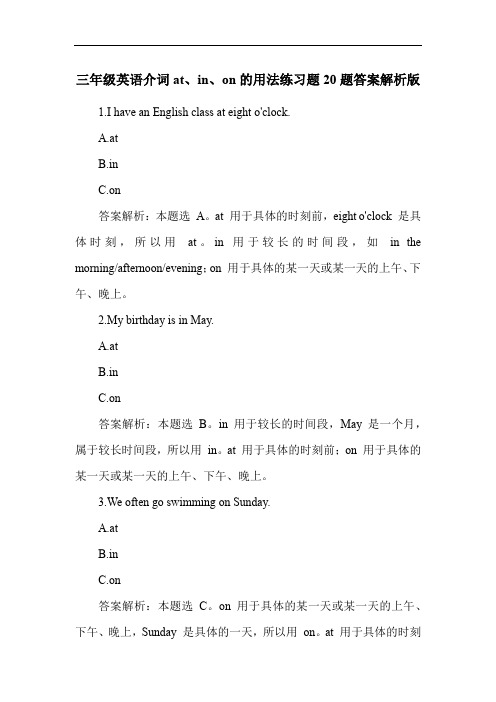
三年级英语介词at、in、on的用法练习题20题答案解析版1.I have an English class at eight o'clock.A.atB.inC.on答案解析:本题选A。
at 用于具体的时刻前,eight o'clock 是具体时刻,所以用at。
in 用于较长的时间段,如in the morning/afternoon/evening;on 用于具体的某一天或某一天的上午、下午、晚上。
2.My birthday is in May.A.atB.inC.on答案解析:本题选B。
in 用于较长的时间段,May 是一个月,属于较长时间段,所以用in。
at 用于具体的时刻前;on 用于具体的某一天或某一天的上午、下午、晚上。
3.We often go swimming on Sunday.A.atB.inC.on答案解析:本题选C。
on 用于具体的某一天或某一天的上午、下午、晚上,Sunday 是具体的一天,所以用on。
at 用于具体的时刻前;in 用于较长的时间段。
4.My father gets up at six in the morning.A.atB.inC.on答案解析:本题选A。
at 用于具体的时刻前,six 是具体时刻,所以用at。
in the morning 是固定搭配,表示在早上。
on 用于具体的某一天或某一天的上午、下午、晚上。
5.The school trip is in October.A.atB.inC.on答案解析:本题选B。
in 用于较长的时间段,October 是一个月,属于较长时间段,所以用in。
at 用于具体的时刻前;on 用于具体的某一天或某一天的上午、下午、晚上。
6.We have a party on Children's Day.A.atB.inC.on答案解析:本题选C。
on 用于具体的某一天或某一天的上午、下午、晚上,Children's Day 是具体的一天,所以用on。
三年级英语介词at、in、on的用法单选题30题(含答案)

三年级英语介词at、in、on的用法单选题30题(含答案)1.We have an English class ____ eight o'clock.A.atB.inC.on答案:A。
“at”用于具体的时刻前,“eight o'clock”是具体时刻,所以用“at”。
“in”用于较长的时间段,如“in the morning”。
“on”用于具体的日期或星期几,如“on Monday”。
2.My birthday is ____ May.A.atB.inC.on答案:B。
“in”用于较长的时间段,“May”是月份,属于较长的时间段,所以用“in”。
“at”用于具体的时刻,“on”用于具体的日期或星期几。
3.We go to school ____ Monday.A.atB.inC.on答案:C。
“on”用于具体的日期或星期几,“Monday”是星期几,所以用“on”。
“at”用于具体的时刻,“in”用于较长的时间段。
4.I get up ____ the morning.A.atB.inC.on答案:B。
“in”用于较长的时间段,“the morning”是较长的时间段,所以用“in”。
“at”用于具体的时刻,“on”用于具体的日期或星期几。
5.We have a picnic ____ Sunday afternoon.A.atB.inC.on答案:C。
“on”用于具体的日期或星期几以及具体的某天的上午、下午或晚上,“Sunday afternoon”是具体的某天的下午,所以用“on”。
“at”用于具体的时刻,“in”用于较长的时间段。
6.The party is ____ six pm.A.atB.inC.on答案:A。
“at”用于具体的时刻,“six pm”是具体时刻,所以用“at”。
“in”用于较长的时间段,“on”用于具体的日期或星期几。
7.My father goes to work ____ the morning of Monday.A.atB.inC.on答案:C。
三年级英语介词at、in、on的用法练习题20题含答案解析

三年级英语介词at、in、on的用法练习题20题含答案解析1.I usually go to school ______ seven o'clock.A.atB.inC.on答案解析:A。
“at”用于具体的时间点,“seven o'clock”是具体的时间点,所以用“at”。
“in”用于较大的时间范围,如“in the morning”。
“on”用于具体的某一天,如“on Monday”。
2.My birthday is ______ May.A.atB.inC.on答案解析:B。
“in”用于较大的时间范围,“May”是一个月份,属于较大的时间范围,所以用“in”。
“at”用于具体的时间点,不适用。
“on”用于具体的某一天,不适用。
3.We have a picnic ______ Sunday.A.atB.inC.on答案解析:C。
“on”用于具体的某一天,“Sunday”是具体的某一天,所以用“on”。
“at”用于具体的时间点,不适用。
“in”用于较大的时间范围,不适用。
4.My father goes to work ______ the morning.A.atB.inC.on答案解析:B。
“in the morning”是固定搭配,表示在早上。
“at”用于具体的时间点,不适用。
“on”用于具体的某一天,不适用。
5.The party is ______ six o'clock ______ the evening.A.at,inB.in,onC.on,at答案解析:A。
“at”用于具体的时间点,“six o'clock”是具体的时间点,所以第一个空用“at”。
“in the evening”是固定搭配,表示在晚上。
“on”用于具体的某一天,不适用。
6.I read books ______ the library.A.atB.inC.on答案解析:B。
“in”表示在某个空间内部,“library”是一个空间,所以用“in”。
- 1、下载文档前请自行甄别文档内容的完整性,平台不提供额外的编辑、内容补充、找答案等附加服务。
- 2、"仅部分预览"的文档,不可在线预览部分如存在完整性等问题,可反馈申请退款(可完整预览的文档不适用该条件!)。
- 3、如文档侵犯您的权益,请联系客服反馈,我们会尽快为您处理(人工客服工作时间:9:00-18:30)。
时间介词i n,o n与a t的用法介词in, on与at都可用于表示时间的名词前,但用法各不相同,其区别在于:一、用in的场合(1)表示“在某年/月/季节”这个含义时,须用介词in。
例如:She came to this city in 1980.他于1980年来到这个城市。
It often rains here in summer.夏天这里常常下雨。
(2)表示“从现在起一段时间以后”时,须用介词in。
例如:They will go to see you in a week.他们将在一周后去看望你。
I will be back in a month.我将在一个月后回来。
(3)表示“在某世纪”时,须用介词in.例如:This machine was invented in the eighteenth century.这台机器是在18世纪发明的.Great changes took place in the twentieth 世纪发生了巨大变化.(4)表示“在某年代或特定世纪某年代”时,须用介词in。
例如:This incident happened in the 1970''''s.该事件发生在20世纪70年代。
The Anti-Japanese War broke out in the 1930''''s.抗日战争爆发于20世纪30年代。
(5)除此之外,morning / evening / afternoon三个词也常跟介词in连用。
例如:Don't watch TV too much in the evening.晚上看电视不要太多。
They sometimes play games in the afternoon.他们有时在下午做游戏。
二、用on的场合(1)表示“在具体的某一天”或“(在具体的某一天的)早上、中午、晚上”等,须用介词on。
例如:Jack was born on May 10th,1982.杰克生于1982年5月10日。
They left on a rainy morning.他们是在一个雨天的早上离开的。
He went back to America on a summer afternoon.他于一个夏天的下午返回了美国。
(2)表示“在星期几”或“在星期几的早上、中午、晚上”等,须用介词on。
例如:We don't go to school on Saturday and Sunday.我们星期六和星期天不上学。
What time do you get up on weekdays?你在平日什么时候起床?I heard this story on Saturday morning.我是在星期六的早晨听到这个故事的。
(3)表示“在某一节日”时,须用介词on。
例如:We usually eat moon cakes on Mid-autumn Festival.我们通常在中秋节吃月饼。
Mr Hu received a card on Teachers' Day.胡老师在教师节那天收到了一张卡片。
三、用at的场合(1)表示“某一具体时刻(即几点几分时)”,须用介词at。
例如:He gets up at six o'clock every day .他每天六点起床。
I got home at five thirty yesterday afternoon.我昨天下午五点半到家。
(2)用在特定的时候(时节、时机)时,须用介词at。
例如:They were happy at that time.他们那时很幸福。
I think the shop is closed at this time of day.我认为商店在白天的这个时候关门了。
(3)表示“在中午、在夜晚、在周末”时,须用介词at。
例如:What do you often do at noon? 你中午经常做些什么?You can see many stars in the sky at night.夜晚你能看到天空中有许多星星。
(4)表示“在……岁”时,须用介词at。
例如:At the age of nine ,the boy could swim well.在九岁的时候,这孩子就游泳游得很好了。
At the age of twenty, I began to teach English at this school.在二十岁的时候,我就开始在这所学校教英语了。
注意:在含有next ,last, this, one ,any, each, every , some, all的词组和tomorrow, yesterday, the day after tomorrow, the day before yesterday 前不用任何介词。
例如:What did you do last summer holidays? 去年暑假你做了些什么?What are you going to do the day after tomorrow? 后天你打算做什么?练习( ) 1. Children get gifts ____ Christmas and ____ their birthdays.A. on; onB. at; onC. in; inD. in; on( ) is nothing ____tomorrow afternoon, is there? -----No. We can have a game of table tennis.A. onB. inC. outD. up( ) 3. A lot of students in our school were born____March, 1981.A. inB. atC. onD. since( ) 4. He suddenly returned____ a rainy night.A. onB. atC. inD. during( ) 5. My grandfather was born____Oct. 10, 1935.A. onB. inC. atD. of( ) 6. The train is starting___five minutes.A. inB. atC. for( ) 7. Mike does his exercises ____ seven _____ the evening.A. on; toB. at; inC. by; ofD. at; on( ) 8. Children wake up very early____the morning of Christmas Day.A. inB. onC. forD. at( ) 9 ____ a cold winter morning, I met her in the stfeet.A. InB. OnC. AtD. For( ) 10 It happened to be very cold____ the morning of our sports meeting.A. atB. onC. withD. of( ) 11. Why did you get up so early ___ this morning.A. onB. /C. atD. in( ) 12. He went to Shanghai___ September 3, 1991 and came back___ a cold morning last year.A. in; onB. on; inC. on; onD. in; ia( ) 13. Lucy was born____ the night of May 12, 1984. . ...A. onB. inC. atD. to( ) 14. Mrs Brown came to China ____ 1996.B. ofC. to,D. in( ) 15 ___ the morning of November 20, 1915, the workers came to Chicago to show their mourning of Joe Hill.A. OnB. InC. OnD. At( ) 16. Ann moved___Hangzhou___September, 1992.A. /; inB. to; inC. to; on D, in; in( ) 17. They started off___an autumn afternoon.A. duringB. atC. inD. on( ) 18. He often goes ____ school ____ six thirty ____ the morning.A. for; to; inB. to; at; inC. to; for; at D, for; at; to( ) 19. He arrived ___ Shanghai ___ 9: 30 ___ March 5. A. at; in; at B. to; on; at C. in; on; at D. in; at; on( ) English teacher told me to get there____ half past ten.A: in B. at C. on D. of答案:B A A A A A B B B B B C A D B A D B D B。
